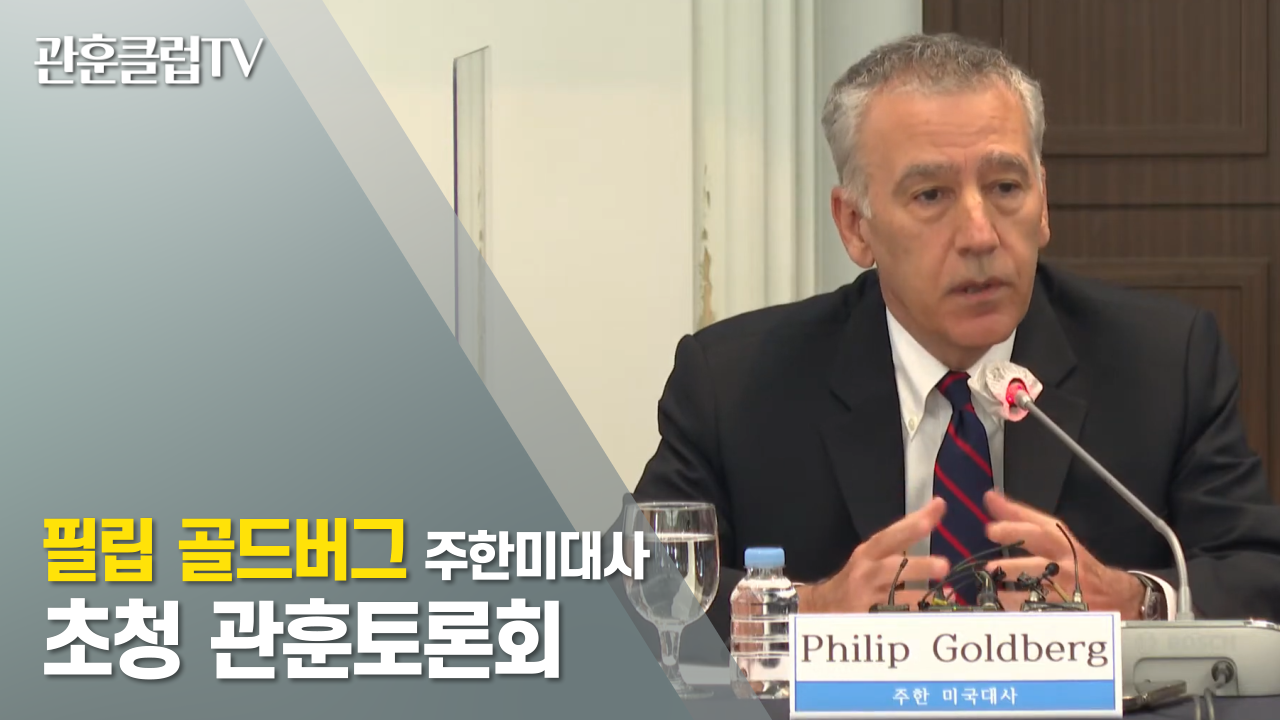필립 골드버그 주한미국대사의 18일 관훈토론회 모두 발언을 국문과 영문으로 함께 소개합니다.
<국문>
박민 총무님 그리고 패널 및 귀빈 여러분, 오늘 이처럼 중요한 토론회에 참석할 기회를 주셔서 감사합니다. 여러분께서는 한미 양자 관계 140년 역사에 대해서, 내지는 철통 같은 한미동맹의 기원과 앞으로 우리가 나가야 할 향방에 대한 발표를 기대하고 오셨는지 모르겠습니다만, 여러분은 언론인이시기에 이미 이에 대해서는 잘 아시리라 생각합니다. 그래서 아마 질의응답 시간에 저를 당황하게 할 질문을 기다리고 계실지도 모르겠습니다. 제가 여러분 자리에 앉아 있더라도 그럴 것 같습니다. 저널리즘은 어려운 일입니다. 그래서 민주주의 사회에서 여러분의 핵심적인 역할을 존경하고 또한 감사한다는 말씀부터 드리고 싶습니다. 오바마 전 대통령께서는 “사람들이 매일 나에게 안 좋은 별명들을 붙이지만, 그래도 나는 그들의 권리를 늘 옹호할 것”이라고 이야기했습니다. 하지만 대통령께서 같은 연설에서 말씀하신 그다음 내용도 똑같이 중요합니다. “자신의 견해, 심지어 우리 미국인들이 동의하지 않은 견해까지도 표현할 수 있는 모든 사람의 권리를 보호하기 위해 미국인들은 싸웠고 목숨을 희생했다”고 같은 연설문에서 말씀하셨습니다.
오늘 여러분이 동의하지 않는 이야기를 제가 할 수도 있습니다. 하지만 140년 우정이 좋은 것은, 양국 관계가 너무나 오랫동안 지속되어 왔기 때문에, 몇 가지 의견 불일치가 있어도 우리 관계는 바뀌지 않습니다. 왜냐하면 우리는 서로의 의견을 존중하기 때문입니다. 따라서 앞으로 몇 분간 솔직하게 말씀드리겠습니다. 양국 군사동맹은 깨뜨릴 수 없는 철통과 같고 한국의 안보에 대한 미국의 의지는 흔들림이 없습니다. 바이든 대통령도 해리스 부통령도 몇 주 전에 그렇게 말씀하셨습니다만, 여러분께서도 최근 로널드 레이건호 항모전단의 한국 방문, 양군 합동 훈련의 지속적인 확대를 통해서도 보셨습니다. 불행하게도 우리의 적들도 자유와 법치가 다스리는 현재 세계 질서를 바꾸기 위해 똑같이 의지를 발휘하고 있고, 그들에게 답하는 유일한 방법은 같은 생각을 가진 민주주의 국가들이 함께 일하는 것입니다. 만약 지정학과 경제 관계를 분리할 수 있다면, 그래서 금전적인 손해 없이 우리의 원칙을 지킬 수 있다면 얼마나 좋을지 우리 모두 공감하리라고 생각합니다.
하지만 세상은 그리 돌아가지 않습니다. 좋든 싫든 이 시대에는 안보, 번영, 민주주의가 서로 얽혀 있고 각각에 대한 전례 없는 도전이 있습니다. 전략적 자원을 통제하는 권위주의적 국가들은 경제적, 정치적, 군사적 이익을 위해 이를 이용할 것입니다. 러시아가 잔혹하게 우크라이나를 침공한 이후에 러시아산 가스가 제한적으로만 접근되는 상황에서 올겨울 난방을 어떻게 해야 하나 궁리 중인 유럽 사람들은 이 사실을 알고 있습니다. 사실 한국인들도 잘 알고 있습니다. 북한의 위협으로부터 이 나라를 보호하기 위해 미사일 방어체계를 배치한 이후 경제적 보복을 견뎌야 했습니다. 또 한편 UN 안보리 결의안의 의무를 소홀히 하고 북한의 미사일 발사나 제재 회피 노력을 막지 못한 중국은 이 같은 위협을 줄이기 위해 한 일이 거의 없습니다. 제지당하지 않은 김정은(북한 국무위원장)을 협상 테이블로 나오라는 반복적인 제안을 점점 공격적인 도발로 응하면서 북한은 평화, 특히 비핵화를 대가로 한 평화에는 관심이 없다는 점을 명백하게 했습니다. 우리는 중국이 세계 무대에서 스스로 주장하는 것처럼 책임 있는 행위자가 될 것을 계속 압박하겠지만, 지역 및 글로벌 도전 과제의 해결에 있어 중국이 계속 이러한 태도를 견지한다면 그들의 지지를 기대할 수 없을 겁니다. 우리는 서로에게 의존해야 합니다. 러시아, 중국과 같은 권위주의적 국가는 민주주의적 국가 간의 불화를 바탕으로 성장합니다. 왜냐하면 우리의 분열은 그들의 행동을 효과적으로 막는 능력을 제한시키기 때문입니다. 그들이 분열의 씨앗을 심을 기회를 우리가 주어서는 안 됩니다. 하지만 그렇게 하면 우리 국민과 삶에 실질적인 영향이 있다는 사실도 알아야 합니다.
미국의 경우, 동맹국 및 파트너 국가와 깊고 지속적인 관계가 우리의 가장 큰 자산이라고 믿고 있습니다. 수십 년 동안 한국, 일본 등과의 동맹 관계가 전 세계 안보, 평화, 번영 증진의 핵심이었습니다. 그 어느 때보다 오늘날 이러한 동맹 관계가 더 중요합니다. 동맹의 능력과 범위가 우리의 집단적 이해관계에 부합합니다. 지난 몇 년 동안 공급망이 국가안보 사안이라는 사실을 우리 모두 깨닫게 되었습니다. 안보와 번영을 위해 같은 생각을 지닌 파트너국 간의 무역과 투자를 확대해서 시장을 더욱더 탄력 있게 만들고 규칙 기반의 질서를 지지해야 합니다. 우리는 정치적인 이유로 우리에게 돌아서서 이 같은 상호 의존성을 무기화하는 이들에게 힘을 실어 줘서는 안 됩니다. 우리는 바로 그렇게 하고 있습니다. 핵심 부문 및 공급망 등 한미 양자 무역은 계속해서 성장하고 있습니다. 미국은 첨단 반도체, 자동차, 이를 위한 부품에 있어서 한국에 의지합니다. 우리가 한국에 의지할 수 있으며, 한국도 미국에 의지할 수 있습니다. 공통의 가치관을 지닌 오랜 친구이기 때문입니다. 미국 기업이 이기면 한국 기업이 진다는 제로섬 게임으로 양자 경제 관계를 규정하려는 사람이 있다면 저는 그에 동의하지 않습니다. 한국, 미국 기업들이 함께 일하면서 경제 모든 부문에서 협력하고 있다는 사실을 완전히 무시하는 견해입니다. 종종 양측의 무역 분쟁이 있기도 하지만 해결 의지가 있고 해결을 위한 메커니즘도 있습니다. 무역 사안을 두고 동맹 혹은 포괄적 글로벌전략 파트너십에 대한 미국의 의지가 약해졌다는 조짐으로 삼는 사람들은 잘못 알고 있는 것입니다.
인플레이션 감축법(IRA)과 관련하여 법안에 나온 전기차 인센티브에 대해 한국은 진지한 우려를 표명했습니다. 우리는 이를 다룰 방법을 지속적으로 논의한다는 의지를 갖고 있습니다. 많은 한국 기업이 이 법안의 다양한 투자 인센티브로 인해 혜택을 받을 것이라 믿습니다. 특정 국내 조항을 예외로 하고 이 법안의 실질적 대상은 기후변화와 공급망이라는 사실을 명백하게 하고 싶습니다. 이 법안은 미국이 탈탄소화를 위한 글로벌 노력을 주도한다는 약속을 지키도록 해 줄 것입니다. IRA 조항들은 너무 늦기 전에 미국이 탄소 배출 감축 목표를 달성하는 데 중요합니다. 기다릴 수 없다는 사실도 알고 있습니다. 공통의 가치에 대해 말씀드리자면 다양성은 장점이고 이를 포용하는 것은 전략적 경쟁자들과 비교했을 때 우리에게 확실한 장점이 된다는 사실을 말씀드리고 싶습니다. 블링컨 장관께서도 말씀하셨듯이 여성과 사회 소외 계층에 힘을 실어 주는 것은 올바른 일이자 국가 안보적 의무이며, 우리는 그러한 맥락에서 양국의 정책을 생각하기 시작해야 합니다. 복잡한 문제를 푸는 데 누가 도움을 줄 수 있을지 예측할 수 없어 모든 사람이 자신들의 잠재력에 도달하고 의미 있게 기여할 수 있는 기회를 갖도록 하는 것이 우리의 이해에 부합합니다. 같은 이유에서, 우리는 우리 국경 밖의 사람들, 이들이 사는 신생 민주주의 국가들도 번창할 기회를 주어야 합니다. 우리와 같은 자유를 다른 사람들도 누릴 때 세상은 모든 이에게 더 안전한 곳이라는 사실을 압니다. 앞서 그 어느 때보다 오늘날 동맹 관계가 더 중요하고 동맹의 능력과 범위가 우리의 집단적 이해관계에도 부합한다고 말씀드렸습니다. 우리가 만든 위대한 한미 군사동맹은 우리가 오늘 누리는 폭넓은 글로벌전략 파트너십의 기초를 제공했습니다. 빠르게 성장하는 한국의 정치, 경제, 문화의 영향력은 세상의 일에 대해 한국인들에게 발언권을 주고, 한국은 이러한 책임을 진지하게 받아들이고 있습니다. 우리 역시 이런 참여를 독려하고 있습니다. (양자 협력의) 일례로, 지난달 미국 국제개발처와 한국 외교부가 개발에 관한 양자 협력 관계를 심화하자는 데 합의했습니다. 양국은 태평양 섬 지역의 기후변화 퇴치, 동남아시아의 사이버 안보 강화, 아프리카 보건 시스템 강화 등 전 세계 다양한 구상에 협력하고 있습니다. 한국은 이 모든 노력에서 중요하고 동등하며 능력 있는 미국의 파트너입니다. 함께 일하면서 우리는 세계 곳곳에서 선을 위한 강력한 힘이 될 것입니다.
같이 갑시다. 감사합니다. 이제 질문을 받겠습니다.
<영문>
President Park, distinguished panelists and guests, thank you for giving me the opportunity to address such an auspicious forum today. You may be anticipating a talk on the 140-year history of the U.S.-ROK bilateral relationship, in which I recount the genesis of our ironclad alliance and outline where we go from here. But you’re all journalists, so you already know all that.
You’re probably waiting to put me on the spot with some of my questions and some of my answers. I would be if I were you.
Journalism, we recognize, is a tough business, and I want to start by saying that we respect and appreciate the critical role you play in a democratic society. As former President Obama once said, “I accept that people are going to call me awful things every day — and I will always defend their right to do so.” But what the President said next in that same speech was equally important.
He said “Americans have fought and died around the globe to protect the right of all people to express their views, even views that we profoundly disagree with.” And today I may say things you disagree with. But the beauty of being friends for 140 years is that our relationship has endured for so long that a few disagreements won’t change things, because we respect one another’s opinions. So let me be frank for the next few minutes.
Yes, our military alliance is ironclad, which means it’s unbreakable, and U.S. commitment to the security of the ROK is unwavering. President Biden said it, as did Vice President Harris just a few weeks ago, but you’ve also seen it most recently with the visit of the USS Ronald Reagan carrier battle group and continued expansion of joint exercises between our forces. Unfortunately, our adversaries are equally committed to changing the current world order in which freedom and rule of law prevail, and the only way to answer them is for like-minded democracies to work together.
I think we all agree that it would be great if we could isolate geopolitics from economic relations so that we could stand up for our principles without taking a hit to our own pockets, but it doesn’t always work out that way. Whether we like it or not, security, prosperity, and democracy are intertwined in this era, and the challenges to each are unprecedented.
The fact is that authoritarian states that control strategic resources will use them to gain economic, political and military advantage. People in Europe trying to figure out how to heat their homes this winter with limited access to Russian gas after that country’s brutal invasion of Ukraine know it, but Koreans do too – having endured economic retaliation after deploying a missile defense system to shield this country against threats posed by North Korea.
Threats, that at times from the People’s Republic of China, which has done little itself to mitigate by neglecting its obligations under UN Security Council resolutions and having failed to counter the DPRK’s missile test and sanctions evasion efforts. Unchecked, Kim Jong Un has resorted to increasingly aggressive provocations in response to repeated offers to come to the negotiating table, making it clear that the DPRK has no interest in pursuing peace and particularly not at the cost of denuclearization. While we will continue to press Beijing to be the responsible actor on the world stage it claims to be, we cannot rely on the PRC to play a supportive role in resolving regional and global challenges if that kind of attitude continues. We must rely on each other.
Authoritarian states thrive on discord between democracies because disunity limits our ability to effectively counter their actions. We shouldn’t afford them the opportunity to sow dissent. Make no mistake, to do so will have real costs for our people and their way of life. In the United States, we believe the deep and enduring relationships with our allies and partners are our greatest asset. For decades, our alliances with countries including the Republic of Korea and Japan have been central to promoting peace, security, and prosperity around the world. These alliances have never been more essential than they are today, and expanding their reach and scope is in our collective interest.
We’ve all come to realize over the past few years that supply chains are a national security issue, not just an economic one. To ensure both security and prosperity, we must continue to expand trade and investment between like-minded partners to make markets more resilient and support partners to make markets more resilient in support of a rules-based order. We must resist empowering those who would turn around and weaponize that interdependence against us for political gain. So we’re doing just that. U.S-Korean bilateral trade continues to grow, including in critical sectors and supply chains. The U.S. depends on Korea for advanced semiconductors, vehicles, and the parts to make them. And we know we can depend on Korea and vice versa, because we are longtime friends and allies with shared values.
I disagree with anyone who attempts to characterize our bilateral economic relationship as a zero-sum game in which if American companies are winning, Korean companies will lose. This completely neglects the fact that Korean and American businesses are working together and collaborating across every sector of the economy. Yes, we occasionally have trade disputes on both sides, but we’re committed to resolving them and have the mechanisms in place to do so. Anyone who would point to such trade issues as a sign of diminished U.S. commitment to the alliance on our broader global strategic partnership is mistaken.
With regard to the Inflation Reduction Act, Korea has voiced serious concerns about electric vehicle incentives outlined in the legislation, and we are committed to continuing discussions on ways to address them. I would add that we believe that many Korean companies stand to benefit from the various investment incentives in the act. But I want to make clear that the real targets of that legislation – aside from certain domestic provisions – is climate change and supply chains. This legislation will allow the U.S. to meet commitments to lead global efforts to decarbonize. Provisions in the IRA are critical to the ability of the United States to reach our carbon emission reduction targets before it’s too late. And we all know that can’t wait.
On issues that deal with our shared values, diversity is a strength and embracing it gives us a distinct advantage over our strategic competitors. As Secretary of State Blinken has said empowering women and marginalized communities in our societies is not only the right thing to do, it’s a national security imperative and we need to start thinking about our policies in that context. We can’t predict who will help us solve complex problems in the future, so it’s in our interest to make sure everyone has a chance to reach their full potential and make meaningful contributions.
For that same reason, we need to give people outside our borders and the younger democracies they live in every opportunity to thrive as well. We know that the world is safer place for all of us when others enjoy the same freedoms we do. I said earlier that alliances have never been more essential and that expanding their reach and scope is in our collective interest. The mighty U.S.-ROK military alliance we built provided the foundation for the broader global strategic partnership we share today. The ROK’s rapidly expanding political, economic, and cultural influence gives Koreans a say in what happens in the world, and you clearly take that responsibility seriously, and we want to encourage that participation.
As an example of our collaboration just last month, the U.S. Agency for International Development (USAID) and the ROK Ministry of Foreign Affairs committed to deepening our bilateral cooperative relationship for development. Our two countries collaborate on a range of initiatives worldwide, including combating climate change in the Pacific Islands, enhancing cybersecurity in Southeast Asia, and strengthening health systems in Africa. The Republic of Korea is an essential, equal, and capable partner with the U.S. in all these efforts. Working together, we will continue to be a powerful force for good across the globe. As we say, Katchi Kapshida.
Kamsahapnida, thank you and I look forward to taking your questions.
















